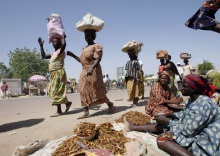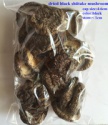The paradoxical situation is in poor developing countries:, they are forced to import food from the rich countries in the form of grain, suffering from a lack of it. Each year, these imports are around three million tons, while those same poor countries annually export about four million tons of oilseeds and fishmeal, which have a higher protein value than corn, and in the western countries are used for animal feed.
One-third of African crops of peanuts enter the stomach of cattle and poultry in Western Europe.
The richest countries are also major importers of agricultural products. These include, for example, Germany, Denmark, Holland and Belgium. Western Europe and Japan import grain by 20% more than all poor countries, although have six times less population.
The Netherlands, for example, in the sixties annually imported more milk powder (for calves) than all underdeveloped countries.
US imports beef, although this is only 7% of the annual meat consumption per capita in the country, in many poor countries, this amount is the annual consumption of meat per person. Interestingly, almost half of this meat comes from the poor and hungry countries in Central America, where the already low annual consumption of meat falls more in recent years.
If to speak about fish, rich countries consume 75% of the world catch, which accounts for about 1/3 of the total population of the globe. 300 years colonial countries have developed plantations not for the benefit of the local population, and for the profit of the colonizers. There was developed the production and sale of tobacco, rubber, coffee, tea, cotton; large areas of land were not used for the production of basic foodstuffs. Now, despite the liberation from the colonial yoke, the products have remained the same in these countries.
Only due to coffee exports live 14 underdeveloped countries.
One tenth of all cultivated land in the world is for the production of flavoring products. In poor countries, their production has increased significantly over the past two decades, which is does not touch the production of food. Irrigation and artificial fertilizer in these countries are intended solely for cash products. As a result, from year to year, increases the need to import food more. It is expensive and, therefore, is intended mainly for the rich strata of society, which means that the owners of the plantations of cash, but not for the poor local population.









